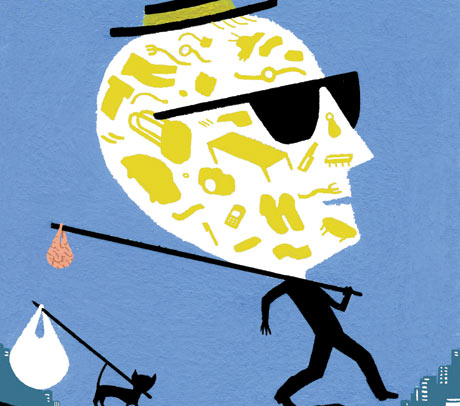
This season's must-have accessory is getting rid of your must-have accessories. The decluttering trend is nothing new, and has much to recommend it, but every week now seems to bring a fresh example of what ascetics might once have called the renunciation of possessions, though we're probably going to have to call it "extreme decluttering". A New Yorker named Kelly Sutton, the BBC reports, is selling almost everything he owns via cultofless.com; his countryman Everett Bogue, whose highly readable blog is at farbeyondthestars.com, claims to live with 57 possessions. Colin Wright, who moves to a different country every four months as determined by readers of his website, exilelifestyle.com, has that down to 55, though one is "assorted pens", which strikes me as cheating slightly. (I made it past 60 without leaving the living room. Then I gave up.) At time of writing, the minimalist travel writer Rolf Potts is three weeks into a six-week round-the-world trip carrying no luggage at all, except what he can stuff in his pockets. "Is it possible to own nothing?" Sutton asks, crystallising the urge behind these experiments. "Well, maybe not nothing… but is it possible to own close to nothing?"
This column has inveighed before about exercises in "simplicity" that aren't really simple, or that simply require a multimillion-pound salary to buy the right minimalist furniture and gadgets. Bogue's 57 items do include a MacBook and fancy Moleskine notebook. But mainly, the extreme declutterers really do seek liberation from possessions, and to such an extent that you wonder if it's such a great recipe for Zen-like bliss.
I don't mean to make armchair diagnoses of the people mentioned. But more broadly, there's something about the "cult of less" that evokes bulimia: a drive to purge, as if consumer culture has binged so thoroughly that it's now obsessed with eradication. Maybe this partly explains the thrill – almost a high, or maybe that's just me – that results from ejecting bagfuls of rubbish from one's attic. But that hardly constitutes freedom from concern with stuff, any more than bulimia constitutes freedom from concern with food. Ironically, the best insight here comes from the tradition the extreme declutterers frequently evoke: Buddhism. Buddhists seek freedom from attachment, but aversion, they'll tell you, is just another form of it, or a close cousin. After all, who's more attached to the idea of belongings: someone always struggling to minimise them, or someone who's fine with what they've got? Nor is it just belongings. George Clooney's character in Up In The Air has a sideline delivering cheesy motivational speeches about jettisoning your "backpack" of emotional ties and stale obligations. But the film seems to say the weightlessness he craves is a pointer to what he's missing. By the end, he's starting to acknowledge that weight isn't always encumbrance; sometimes, it's an anchor.
One intriguing aspect of "extreme decluttering" – and I'll never utter that phrase again, I promise – is the way its adherents count their Kindles and iPods and MacBooks as single items, as if a book or album being digital meant it didn't exist. Physically it may not, but where aversion and attachment are concerned, it's the psychological level that matters. Psychologically, you still own those books. And psychologically, if you're fixated on owning less stuff, you're still fixated on stuff.
oliver.burkeman@theguardian.com

